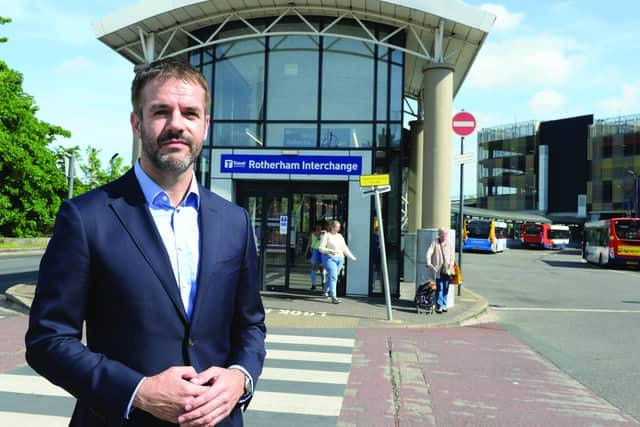South Yorkshire Mayor says extra bus funding is needed to halt 'spiral of decline'
The Labour mayor said the region has £17m which can be used to keep services on the road over the next two years – just over half the amount it requires (£29m) – after the Government cut its grant by around 50 per cent.
It comes after the Department of Transport pledged to provide £1.1bn to support bus service improvement plans in 31 areas of the country last year, but rejected South Yorkshire’s bid for £434m.
Advertisement
Hide AdAdvertisement
Hide AdMr Coppard said the region needs a “fair level of funding” from the Government so it can protect and improve services millions of people rely on.


Private operators claim they will be forced to cut more services without larger taxpayer-funded subsidies, because they have been struggling to cover their costs since passenger numbers plummeted during the pandemic.
Mr Coppard said the South Yorkshire Mayoral Authority, which he runs, has already “raided its reserves” to maintain the region's “core network” with a £17m investment, but some evening and weekend services will be cut.
The Zoom Beyond pass, which provides discounts to 18-25-year-olds, is also being scrapped in November.
Advertisement
Hide AdAdvertisement
Hide AdThe mayor, who has pledged to bring buses back under public control, said the impending service cuts are part of a long-term “spiral of decline” and the current system is “broken”.
He said there are 42 per cent fewer buses on the region’s roads compared to a decade ago, with a 20 per cent reduction in the network in the last year.
“The private sector bus companies that run that broken network basically choose when and where to run buses, and what to charge,” he said.
“All we can do is step in when they don't want to run a service for profit and pay them money, increasingly large amounts of money, to run services, particularly in rural areas.”
Advertisement
Hide AdAdvertisement
Hide AdHe added: “What we're finding now is the government is not prepared to fund places like South Yorkshire and give us the money we need to provide a reliable, efficient, effective network.”
The Government has provided £2bn of support to operators across gthe country during the pandemic and in May it recently announced they will receive another £300m over the next two years.
Operators have also recieved hundreds of millions of pounds of taxpayers money to cap fares outside London at £2 until the end of October. They will then be capped at £2.50 for a year.
However, bus companies claim they are still struggling and, in April, two that are based in Yorkshire revealed their profits had “significantly decreased” after their Government funding was cut and said they may need to cut more services in the coming months.
Advertisement
Hide AdAdvertisement
Hide AdFirst South Yorkshire recorded an operating profit of £0.7m in the year ending March 2022, down from £8m the previous year. Its sister company, First West Yorkshire, saw profits fall from £8.5m to £4m over the same period.
South Yorkshire Mayoral Combined Authority is drawing up plans to introduce a London-style franchising model in the region that would bring routes, services and fares back under public control.
“We’re moving at pace,” he said. “But legally, under the terms set out by the Government we have to go through a series of stages in order to be able to make that decision.”
“Over time we could take the buses back under public control and that is a possibility, but until we have a partner in government who can work with us to put the proper amount of funding into places like South Yorkshire, we will just continue managing the decline.”
He is due to host a series of public meetings this month, in Sheffield, Peniston and Doncaster, Rotherham, to discuss issues with the region’s bus network and possible solutions.